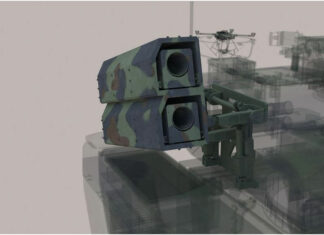Man portable, light weight missile systems were used extensively in recent years. U.S. Javelin missiles are regularly used in Afghanistan by U.S, and British forces, side by side with the Israeli Spike, used by the Dutch, Italian and Spanish among others. Javelin has been used extensively in Iraq, employed as a short and medium range precision guided weapon targeting insurgents in buildings, vehicles and at suspected sniper positions.
The Spike also saw an extensive use by Israel Defense Forces (IDF) infantry, during the recent conflicts in Lebanon and Gaza. On the other side, Hezbollah also fired significant numbers of Russian Metis M medium range guided missiles, among other, heavier guided missiles, fired against the Israeli armor, primarily Merkava Mk 3 and Mk4 tanks, during the 2nd Lebanon war in 2006. (Part I: “From Anti-Tank to Multi-Purpose”)
As western armies are seeking lighter equipment for their dismounted infantry, anti-tank weaponry is also required to shed some weight. Such missiles generally have shorter range, but retain effective reach to distances considered effective for modern asymmetric warfare (600 – 1,300 m’). Another feature is the ability to fire from enclosure, however, this important capability usually comes with a price- adding substantial weight to the weapon. (Part II: “From Anti-Tank to Multi-Purpose”)
Even in the 21st century, weapons are commonly priced by the pound, hence, the lighter the weapon, the cheaper it would be. Reduced cost is an important argument, when mass production is considered. Utilizing mass-produced components, such as Miniature Electro Mechanical Systems (MEMS), off-the-shelf optronics and electronics all contribute to reduced weight and cost of ‘smart guided missiles’. (Part III: Miniaturization of the Infantry Weapons’s Components”).
Another option to reduce weight and cost is the use of unguided rockets, assisted by advanced ranging, sighting and motion sensors to compensate for aiming errors. (Part IV: Smart Launchers for Smarter Munitions.
Smart weapons usually don’t come cheap, especially electro-optically guided weapons, which often employ advanced imaging sensors, processors and datalinks, in addition to the standard elements employed with wire-guided or laser-homing weapons. (Part V: EO Guided Missiles – Always in Control”). Rafael is designing two new versions of the Spike, both will cost significantly less than today’s Spike, while retaining the missile’s main advantage – electro-optical guidance. The Mini-Spike will utilize an advanced, miniature gimballed EO seeker and smaller warhead, to enable extremely high precision. The Spike SR will use a static, ‘strap-down’ seeker, using powerful image processing to stabilize the image during the flight, and compute steering commands to guide the missile on its course to score a direct hit at a range exceeding 1,000 meters.
The Javelin is also undergoing extensive upgrades. To bring the weapon up-to-date with current and future requirements, particularly regarding hybrid warfare, the U.S. Army plans to field by 2014 the ‘Javelin Increment II’ weapon system – an enhanced version of the missile. These improvements will increase the weapon’s effective range, precision and introduce a ‘regret’ function to avoid fratricide or excessive collateral damage by introducing ‘Precision Terminal Guidance’ capability.
EO guided missiles could become even cheaper when a new technology combining laser and EO guidance is matured. The new concept, patented by the Israeli company Shilat Optronics, employs ultra-small components that can be used at the lower echelon, for target acquisition and designation. On the weapon’s end, enhanced imaging sensors are used instead of the standard four quadrant laser detectors. These cameras are modified to detect and identify targets marked by specific CW or pulsed lasers. (Part VI: “Combining EO/Laser Guidance for Small Precision Guided Weapons”)





















